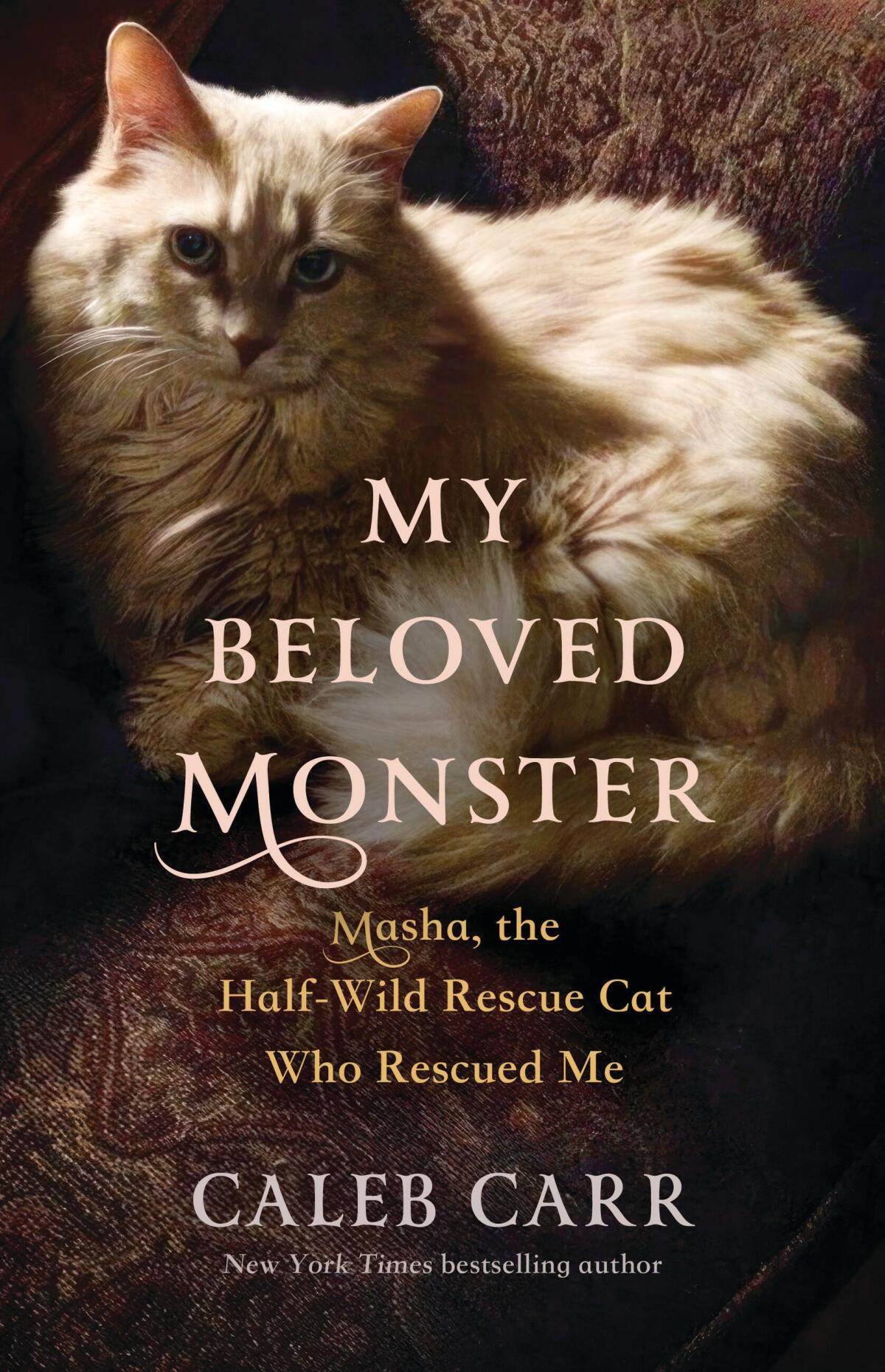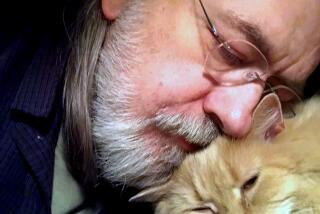âAlienistâ author Caleb Carr â grieving his late cat â reflects on his life amid battle with cancer

On the Shelf
My Beloved Monster: Masha, the Half-wild Rescue Cat Who Rescued Me
By Caleb Carr
Little, Brown: 352 pages, $32
If you buy books linked on our site, The Times may earn a commission from Bookshop.org, whose fees support independent bookstores.
Caleb Carr visits the grave of his beloved Masha, whom he considers the love of his life, every day. âWe have a little chat,â said Carr, best known for his 1994 crime novel âThe Alienist,â during a video call from his home in upstate New York. Itâs late at night â Carr is a longtime night owl who does most of his work after it gets dark â and the author, who now has a long white beard, is thinking about grief and dying â subjects that linger over his new nonfiction book, âMy Beloved Monster,â and loom over what might be the final months of his life.
Masha, the beloved monster, was a Siberian forest cat whom Carr rescued from a shelter and built a life with in his mountainside home in Cherry Plain, N.Y. Animals, particularly cats, had long been a source of companionship and comfort for Carr, an antidote of sorts to a chaotic, abusive childhood in New Yorkâs Lower East Side. As Carr writes in the new book, his father, the Beat poet, journalist and convicted manslaughterer Lucien Carr, had a habit of knocking his son down flights of stairs. âI began to understand that he was trying to kill me,â Carr writes. âAnd while I didnât yet know about his pastâ â Lucien Carr stabbed David Kammerer to death in 1944, later claiming that Kammerer came on to him sexually and offering a âgay panicâ defense â âI certainly recognized, from the horrifying and even gleeful expressions that would enter his face when he came after me, that he was capable of killing.â
Just how long has it taken Hollywood to adapt âThe Alienist,â Caleb Carrâs bestselling novel about a serial killer on the loose in Gilded Age New York?
âI have been living with the idea of death since I was a small kid because my father taught me about it,â he said. But death has become much more than an idea of late. Carr, 68, has cancer, which started in his prostate and has spread throughout his body.
âIf I could be around when the book is published, that would be really nice,â he said in late January. âI donât know whatâs going to happen when, but itâs not going to be good. I always knew cancer moved fast, but boy, when it starts to move, it starts to eat you. Madness. Just madness.â âMy Beloved Monsterâ will be released on Tuesday.

It was Mashaâs death on April 5, 2022, and Carrâs subsequent despondence, that led him to write âMy Beloved Monster,â which reads as a love story, a tribute and a reminder that, in some instances, the uncomplicated love of animals helps humans keep going.
A blond, long-haired beauty with a wild side who had been rescued from a cat hoarder, Masha initially greeted Carr, as he writes, with âone of the most communicative gazes Iâd ever seen in a cat, a look facilitated by the structure of her face: the eyes were oriented fully forward, like a big catâs rather than a domesticâs, and seemed to comprehend everything she was studying â especially me â only too well.â Carr writes about cats with a tender vividness that might make you see your own pets through new eyes.
As a child Carr lived in an environment where people couldnât be trusted, with wild parties and everyday life descending into violence. He lived in a neighborhood so rife with drugs and prostitution that it provided the shooting location for the climax of Martin Scorseseâs âTaxi Driver.â But he always had animals: dogs, gerbils, fish, rabbits and, most to the young Carrâs liking, cats. The family cats would join him in cowering from the domestic turmoil, and comfort him as he reeled from another beating. They seemed to understand him.
Explore the mysteries of fictional and real worlds with four Los Angeles writers who pay homage to giants of the genre while creating stories that are irresistible in their own right.
Carr would go on to a career as a military historian, journalist and novelist, reaching a wide audience with âThe Alienistâ (and its 1997 follow-up, âThe Angel of Darknessâ). The books put his darkness into words as he told the story of a late 19th century forensic psychiatrist on the trail of a serial killer. But he never really forgot his four-legged friends. When he met Masha, he quickly realized he had found a soulmate.
âAnimals fulfill something that was damaged in all of us when we were very young and canât be fixed by people,â Carr said. âWe can go on to have relationships with people, but those wounds need a different kind of treatment than people can provide, and that causes trouble when you have to explain that very carefully to whatever girlfriend or whatever significant other you have. I never lasted as long with a woman as I did with Masha, God knows, and no woman ever did for me what she did, which sounds crazy even to me. But itâs really true.â
Carr was actually contracted to write another âAlienistâ book, but the spirit did not move him. He was deep in grief and needed to get it onto the page. He began cranking out the story of his life with Masha and sent a draft to his editor, Bruce Nichols, who was also the publisher of Little, Brown before he stepped down in March. Nichols was on board with Carrâs change in direction from serial killing to cat love.
Don Winslow reveals why his latest novel, âCity in Ruins,â the final installment in the Danny Ryan series, will be his last.
âIt was clearly a passion project for him, not only because of his medical situation but because he spent his whole life with cats and this one was very special to him,â Nichols said. âIf youâre a cat lover and owner, or a dog person, I think it will resonate with you. And I donât think it matters whether you care about historical fiction or military history or any of Calebâs past experiences. Itâs sui generis. It is what it is, and itâs an amazing book.â
Carr certainly hopes to tap into the pet community (and perhaps see if any âAlienistâ fans are Catster subscribers). He also hopes to win over skeptics who might doubt whether one can love and grieve a beloved animal with the intensity usually reserved for another human.
âIâm hoping that some people will learn from this, and maybe even catch themselves almost thinking of Masha as a person,â Carr said. âThatâs really what we have to do as a society much more: Think of these animals as our equals. Thatâs what they are.â
More to Read
Sign up for our Book Club newsletter
Get the latest news, events and more from the Los Angeles Times Book Club, and help us get L.A. reading and talking.
You may occasionally receive promotional content from the Los Angeles Times.











